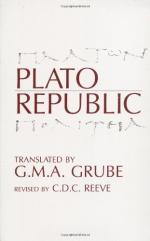|
This section contains 1,401 words (approx. 5 pages at 300 words per page) |

|
Plato's and Aristotle's Views on Knowledge
Summary: An examination of the different epistemological concepts of Plato and Aristotle regarding what knowledge is and the process through which it is obtained, including an argument for the superiority of their philosophical viewpoints on this issue over those of others.
In this lesson, it talks about how Plato and Aristotle view knowledge and the process whereby it is obtained. They both point out that many epistemological concepts which they believe where knowledge comes from and what it is actually. Most of them have been astonished me in certain ways, but I found that rationalism and "wisdom consists in knowing the cause which made a material thing to be what it is" make the most sense to me regarding the nature of knowledge. As the following, we will discuss about why these two philosophical viewpoints are superior and the others are inferior.
Aristotle believes that sensory perception of material objects is knowledge and he says, "Our senses begin the process of finding the answer, because they are physically close to our minds." However, sensations and feelings are very subjective, and the results of sensation vary from person to person...
|
This section contains 1,401 words (approx. 5 pages at 300 words per page) |

|


